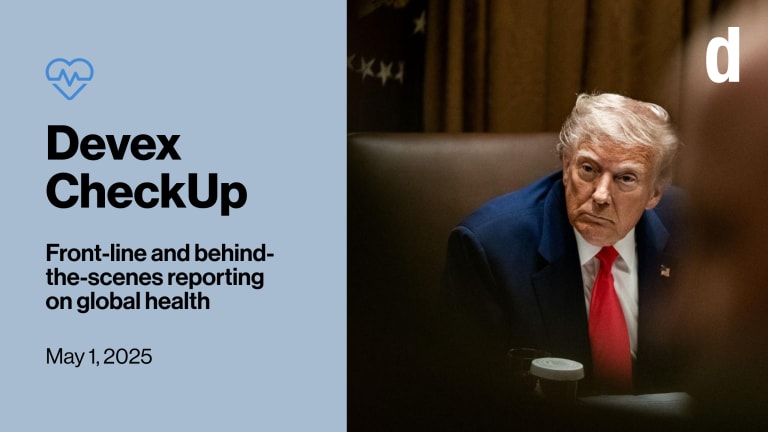
We got back from the 75th World Health Assembly last weekend feeling equal parts hopeful and concerned about the state of global health. While it was encouraging to see nations agree on strengthening financing for WHO, other issues such as a proposal to call out Russia on health care attacks in Ukraine saw many abstainers. This reflects countries’ fear of condemning the war directly, which could have implications for how the international community perceives similar attacks in the future.
This is a preview of Devex CheckUp
Sign up to this newsletter for exclusive global health news and insider insights, in your inbox every Thursday.
• WHA went late Saturday due to disagreements over draft text on global health strategies around HIV, viral hepatitis, and sexually transmitted infections for 2022-2030. Several countries, such as Saudi Arabia and Egypt, opposed the inclusion of references to “sexual rights” and “comprehensive sexuality education.” While their opposition wasn't enough to stop the strategies’ approval, there was a clear lack of consensus.
• Right after a vote that saw 61 countries in favor of a resolution to implement the strategies — with two against, 30 abstaining, and 90 absent — Nigeria said it “disassociates” itself from several terms and phrases, such as “sexual orientation,” “transgender,” and “men who have sex with men.” Egypt said it will do its best to implement the strategies — but only in a way that aligns with its national context. Both countries abstained from voting.
• The lack of consensus raises questions about the global goal of ending these epidemics by 2030. Eamonn Murphy, a deputy executive director at UNAIDS, told Jenny that he’s concerned about young people in particular. “When they do not have access to comprehensive sexuality education, their knowledge sources are often poor and uninformed, causing young people to have a higher risk of HIV, and being less able to address issues of violence and sexual abuse,” he wrote by email.
Background reading: Governments are ‘trying to muzzle WHO,’ says HIV activist
The issue of inequity dominated discussions at WHA — with a clear sense that it’s not going away, despite all the lessons from the pandemic. Dr. Githinji Gitahi, the group CEO at Amref Health Africa, perhaps summed up the sentiment best in an event hosted by Devex: “I have hope in humanity [but] I don't have hope in our systems.”
Read: ‘Goodwill is not enough’ to achieve vaccine equity
+ Join us on June 9 for a Devex Pro Live event on USAID’s largest-ever suite of contracts — Beyond NextGen: Solving the challenges of health supply chains. Save your spot.
Tough customers
An estimated 100,000 public health care facilities in sub-Saharan Africa don’t have access to reliable electricity. Off-grid energy companies consider them risky customers, and not enough investment is put into the maintenance of renewable energy systems. Our colleague Sara Jerving reports on how the World Bank and Power Africa are aiming to change this.
Read: Turning health clinics into appealing customers to the energy sector (Pro)
+ Devex Pro subscribers can also read about African leaders’ bloc position over just energy transition. Not a Pro subscriber yet? Start your 15-day free trial.
Davos dispatch
On the sidelines of Davos, Arnaud Bernaert, the head of health security solutions at Swiss company SICPA, told Devex Editor-in-Chief Raj Kumar that the global health community needs to stop using the word “surveillance,” as it feeds conspiracy theories and undermines the sector’s objectives.
+ What would be a better word for monitoring progress and challenges in global health? Tell us, and we’ll feature your answers in a coming edition of CheckUp.
Shifting the goal posts
“If you're at 5% or 9% vaccine coverage, 70% is a long way away. What's important is to focus on what you have immediately set for yourself to succeed at.”
— Ted Chaiban, global lead coordinator, COVID-19 Vaccine Delivery PartnershipSpeaking to Jenny, Ted Chaiban — who leads the COVID-19 Vaccine Delivery Partnership established by WHO, UNICEF, and Gavi, the Vaccine Alliance — stressed the need to focus on country targets for vaccinating against COVID-19 instead of the 70% global goal set by WHO.
Read: Some LICs make COVID-19 vaccination progress, but far from 70% target
Allies no more
Wahid Majrooh, a former minister of public health for Afghanistan who attended WHA as vice chair of WHO’s executive board, said the assembly paid insufficient attention to his home country and the health issues plaguing his compatriots.
Look out for Amruta’s story next week on how Afghanistan’s health system is suffering due to a lack of international engagement.
+ Catch up all our coverage of aid and development assistance for Afghanistan.
Words of encouragement
Your next job?
International Health Financing Expert
Deloitte Consulting Overseas Projects LLC
Remote
“Thank you to Devex for … your reporting over the course of the pandemic. There were very few places to get solid information about what was happening. And Devex, I think, certainly for the professional development community, was an incredibly important one,” said Nina Schwalbe, the principal at Spark Street Advisors and an adjunct assistant professor at Columbia University's Mailman School of Public Health, during our side event at WHA last week.
What we’re reading
Unable to afford importing essential medicines, Sri Lankans face a medical emergency. [The Guardian]
A TRIPS waiver is necessary to vaccinate the world but it is not sufficient, Schwalbe writes. [Financial Times]
A pregnancy hotline helps thousands of mothers in India. Then its funding stopped. [CNN]






